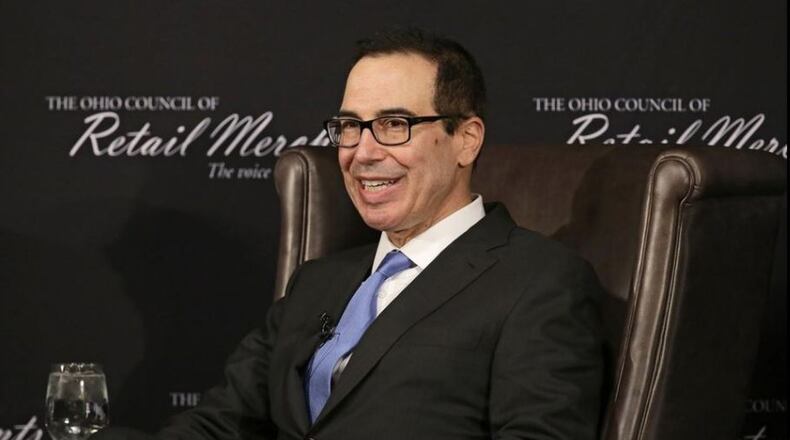Both the U.S. House and Senate are working on tax plans that would revamp the rules on deductions, brackets and rates. The last major overhaul of the federal tax code occurred in 1986.
“Our economic plan is really focused around tax reform, regulatory relief and trade,” Mnuchin said. “A big part of that is the tax reform and tax cuts that we are hoping to get passed and signed by the president in December.”
Related: House panel approves tax reform bill, as Senate GOP unveils rival version
At the center of both proposals is a plan to slash the corporate tax rate from 35 percent to 20 percent, which Mnuchin says will allow companies to reinvest savings into hiring workers or buying new equipment.
He argued the plans are not aimed at benefiting the wealthy, as many critics have said.
“There is no question in my mind that over the last eight years, this has been a great environment for rich people. But for the average worker, their wages have gone nowhere,” he said. “And this is something that I really saw, as I traveled around the country with the president during the campaign. This is as much about creating tax cuts that will spur investment and also about jobs and wages.”
Related: Senate GOP unveils tax plan
Ohio Democratic Party Chairman David Pepper countered that the Republican-backed tax reform relies on trickle-down economics that he says have long failed to produce promised jobs and growth. “This thing is basically a huge tax cut for corporations and people doing very well,” he said. “I think everything else is trying to dress it up to make it seem like something it’s not.”
Policy Matters Ohio, a left leaning think tank, said the plans will deliver huge cuts to wealthy Americans and corporations and provide modest or negligible benefits to everyday Ohio families.
“For many families, the value of any tax cut they get will be wiped out as the deficit explodes, driving pressure to cut health care, nutritional assistance, financial aid and funding for clean water and safe roads,” said Wendy Patton, of Policy Matters Ohio, in a written statement.
Under the Senate plan, according to the group, the richest 1 percent in 2019 would get an average tax cut of $32,300, while Ohio households in the middle 20 percent would see a savings of $630.
Republicans say the tax cuts will spark economic growth, offsetting the cost. But the Senate plan could add as much as $1.5 trillion to the nation’s publicly held debt during the next decade, according to at least one projection. And the Congressional Budget Office has projected a $10 trillion increase in the deficit over 10 years if there is no change in the tax laws.
Related: GOP plan calls for tax cuts, major changes on deductions
Parts of each plan are controversial. The Senate plan calls for ending a popular deduction used by one in four Ohio households that lets them write off the amount of money they pay in state, local and property taxes from their annual federal income tax returns. This is particularly popular in states with high property values and high tax rates.
Mnuchin, who noted that he has lived in two of the highest tax states in the country, said, “Let me just say, fundamentally we believe that the federal government should get out of the business of subsidizing the states, that we need to create a more fair and level playing field and simplify the tax system and get rid of a lot of deductions.
“Now, having said that,” he added, “we are sensitive to the impact on the high tax states.”
Related: Mnuchin asked to use government plane for honeymoon
About the Author

